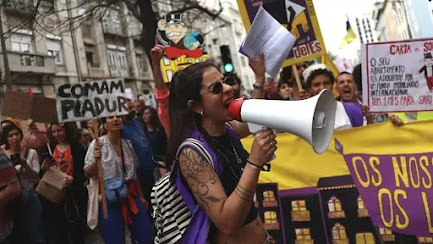The rent in Portugal's capital Lisbon has gone triple the minimum wage.
"The landlady's been chasing me since 2018, she says she needs the flat - now there's an eviction notice."
Georgina Simões is a carer at a nursing home in the Portuguese capital Lisbon. She earns just above the minimum wage.
Her rent, at €300 (£262) a month, is low by the city's current standards. But she still has to work two jobs to afford it. And conditions at the property are poor - she can't shower because water leaks into the neighbours' flat.
"I don't leave because when I look for houses my salary isn't enough, even to pay rent. Rent prices are above the wages we have in Portugal."
Georgina's circumstances are far from unique. Average rent in Lisbon is now just over €2,000, while the minimum wage is about €760.
Portugal is currently grappling with a severe housing crisis, triggered by an increase in foreign investment in property and a lack of affordable new homes.
But it's not simply an issue of supply. Researcher and activist Rita Silva, who helped set up the housing movement Habita, says there are "more houses than people, but prices don't go down".
She adds that the current crisis - which has sparked numerous campaigns pushing for more affordable housing - has spread across the country over several years following the financial crisis of 2008.
The case involving Georgina, the carer, is now in the courts, and she hopes to remain at her property for a further six months. Her lawyer is trying to buy her that time.
What happens if she loses, I ask.
"I'll be out on the streets," she says. "I don't have a chance, I don't know what will happen. I just need a roof to sleep under - I spend my life at work."
Joelsy Pacheco, meanwhile, juggles two jobs as a nurse on average for 16 hours a day, working at an intensive care unit at one of Lisbon's main hospitals as well as at an NGO.
"Most of my wages go on rent, not to mention bills, food, transport," she says. "With just one job, it would be almost impossible."
Her lease will end later this year, and she is worried her rent will rise.
"Where would I go next?" she asks. "It's likely I'll have to move back in with my mum, far away from work - and I'll have to restructure my entire life."
Earlier this year, Portuguese comedian and activist Diogo Faro unintentionally became one of the faces of the affordable housing movement, after posting a video on social media about soaring rent prices in Lisbon.
Soon, his inbox was flooded with messages.
"There are divorced couples who can't move out because they can't afford it, which I think is brutal. Older people that are choosing between paying rent or medication, so they're shortening their lives to have a roof," he says.
As he received more and more stories like these, the comic got together with a few friends and started the movement Casa é um Direito (Housing is a Right).
His and other housing movements planned a demonstration that drew more than 30,000 people to the streets of Lisbon. The protests then spread to other cities, such as Porto and Braga.
"We've called the protests A House To Live, because people are desperate. They want a house to rest, play with their kids, to live," says Diogo Faro, who sees this as just the beginning of the fight.
Author: Antonio Fernandes, BBC

.png)


0 comments:
Post a Comment
Grace A Comment!